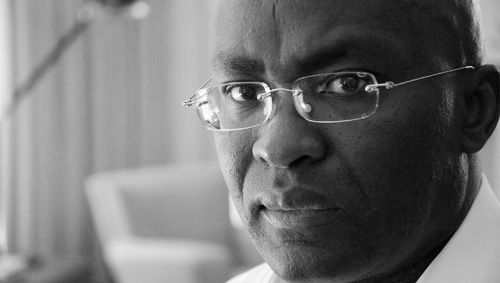
A lecture by Achille Mbembe in memory of Professor Colin Richards, Between the Lines conference, 26 February 2013, Michaelis School of Fine Art, University of Cape Town.
KAVISH CHETTY
I am not entirely persuaded by Achille Mbembe’s keynote address for the Between the Lines conference at Hiddingh Campus. He lapses almost immediately into the familiar registers and lexical sleights-of-hand of critical theory: “the other”; “alterity”; and that stylistic disinterest in indefinite articles which produces constructions like “world as method”. His lecture – which he inaugurates with a nod to recently departed Michaelis artist/writer, Colin Richards – centres on the “question of the human” and its boundaries (the animal, machine and waste); the “encounter” between subjects and the field of inquiry such encounters delimit: among them, “distance”, “proximity”, “elasticity and its perversions”.
Above all, Mbembe wishes to import from the linguistic order the term “translation”, and engage the encounter between human subjects – subjects racialised, gendered, politicised, socialised, ethnicised, whatever – as events of translation (how we “cross boundaries” or “decipher” the other). His ambition is to revisit the site of social encounter with the optic of translation. As to what analytic value this adds to the already existent volume of postcolonial scholarship on cultural contact or collision, I must admit I don’t know. It doesn’t help that Mbembe – a remarkable and prodigious thinker whose work, On the Postcolony, is an invaluable contribution to the field – orates in a froth of abstraction, having a séance with Baudrillard and Levinas, and then necessarily and predictably firing a few rounds at “late capitalism”.
All of this, I imagine, strikes the reader as being perhaps unfair and roguishly disrespectful to Mbembe, so let me provide my full assurances that he has some wonderfully eloquent things to say, including a brief psychoanalytic reading of the kinds of subjectivities produced by racism, and an interesting diagnosis of the kinds of psychic and perceptual maladies impacted upon us by our simulacral world (the age of image-capitalism). My concern is more that this register of high-semiotic abstraction doesn’t appear to say anything beyond a body of scholarship that has already long-suffered the problematic of human encounters. It appears, rather, to recipher the conceptual terrain in a different tongue, and one that isn’t all that new to anyone who has laboured with the Gallic urge for hyperbole. Still, the question is philosophically and politically crucial under present conditions (more on this later), and Mbembe eloquently uses the protocol of translation to impart an “ethical and political valency” to the discourse.
Contextualising his talk, Mbembe says:
Place, or what we call localities, are produced not necessarily by hybridisation, but through the sedimentation of a complex milieu of circulating global forms – [which are not] freely chosen by actors in particular places – and by the negotiation and mutual tension between each other.
Remarking on what is peculiar about our age, he speaks of the “techno-phenomenological institution” of image-capitalism,
a form of capitalism in which the image has not simply taken over the calculative functions yesterday associated with numbers. The circuits from affect to emotions, and from emotions to passions and convictions are more than ever before attached to a circulation of images meant to stimulate desire; the connection of affect and capital serve to reconfigure not only the everyday, but also the physical, political and psychic conditions of embodiment in our times.
Capitalism has, in other words, rearranged our “logics of perception”, it has “proletarianised the nervous system”, orienting us towards value-extraction, and these two larger quotations of his taken together, underscore the problem for social relationships embedded within this monolithic network.
Mbembe makes some valuable excursions into the dynamics of trauma and its constitutive function in South African identity – a theme which shares something in common with Jacqueline Rose’s extraordinary seminar at the African Gender Institute last week. However, his primary question is “how to be human” under conditions such as these, and he organises this under the intellectual project of creating “spheres of singularity”, changing our expectations – a “gradual transformation” and a “change in sensitivity” – in all of which language plays a critical function. “Translation might be understood as a hidden resource,” he says, “allowing us to switch from one paradigm to another. Translation must become a peculiar act of reparation, where each of the languages becomes a guarantee of the other.” He concludes with this rather cryptic suggestion, and then fields questions from the audience – including some provocative remarks from Ronald Suresh Roberts who speaks of “a call to respect the untranslatable”, and a question regarding the distinction between translation and interpretation.
 SLiPStellenbosch Literary Project
SLiPStellenbosch Literary Project